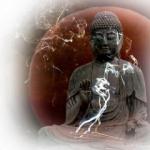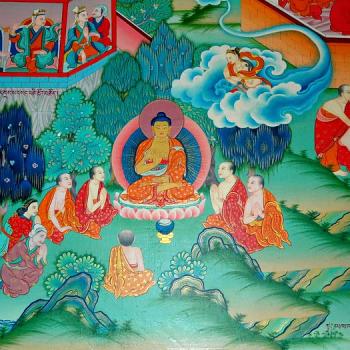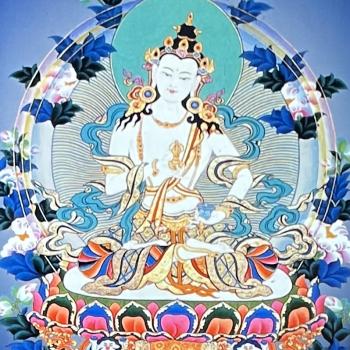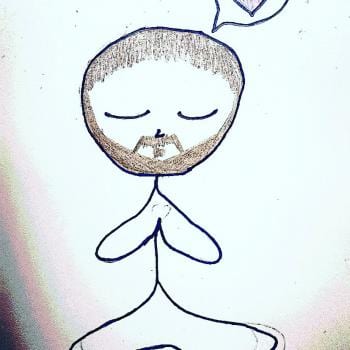I was reading a book called “Nectar of Manjushri’s Speech” by Kunzang Pelden and I came across a teaching that I wanted to share.
This text, by the way, is a detailed commentary on “Way of the Bodhisattva”. I recommend this book if you’re interested in going deeply into Bodhisattva teachings. The section I’m talking about today is the section on Diligence.

This is a teaching called “the Four Forces” which represents four things that help us in the cultivation of diligence.
From the book:
“Just as the son of a chakravartin (great king) who turns the wheel of power, is able to establish others in virtue by relying on his four armies, in the same way, the Buddha, who turns the wheel of Dharma, has given to his Bodhisattva children four forces also, so they too can accomplish the welfare of beings. These four forces are aspiration, steadfastness, joyfulness, and relinquishment.”
I read that and wanted to explore these forces.
Aspiration is defined as “a keen interest in the dharma”
Steadfastness (or self confidence) is defined as “whereby one does not go back on what one has begun”
Joyfulness is defined as “whereby one takes pleasure in what one is doing”
Relinquishment is defined as discarding the things that don’t serve us.
What is Aspiration?
Aspiration essentially means hoping for something or trying to achieve a goal. In this context we’re talking about the goal of Enlightenment. And, because we’re talking about the great Bodhisattva path, we’re really talking about aspiring to Enlightenment for ourselves, but for everyone else as well. If that sounds like a daunting goal that’s because it is. This is about setting an intention. We have to remind ourselves sometimes that this path is not a hobby. It’s also not something just to be done when we’re sitting on the cushion or in the temple. The Bodhisattva journey should be with us all the time. We use the word “aspiration” here instead of “goal setting” or “resolution” because it speaks to it being something deeper. And we have to remind ourselves what we’re doing and why. If we’re unclear about why we’re on the Bodhisattva path, that may be a thing for us to explore. But it’s really setting this intention at the beginning that underscores what we’re trying to do. This is why Buddhists often take some form or another of vows. It’s an effort to make what we’re doing clear in our minds.
What is Steadfastness?
Steadfastness means being firmly resolute. This is what keeps us going. Aspiration was setting the goal and steadfastness is our determination to follow through. We need to develop this quality because the truth is it’s easy to fall away on this path. It’s easy to blow off our meditation practice. It’s easy to stop practicing generosity and virtue. We need determination to stick to it. An aspect of this is self-confidence. Self-confidence is believing we can do it. The Buddha was an ordinary person like us and he attained Enlightenment. Shantideva was an ordinary person like us (and he had no friends) and he attained Enlightenment. There’s nothing stop us but ourselves. We are in our own way. Because our Aspiration is clear, we can cultivate determination as well to not just start on the path but also to keep going, especially when we don’t really want to.
What is Joyfulness?
Joyfulness means a feeling of bliss or well being. In this context we’re talking about getting excited about the path. This is something that could be easy to overlook, so it’s important. We are striving to attain Enlightenment for ourselves and others. We are pursuing the path to be free from suffering. This is something to get excited about. We used Aspiration to set our intention and we derived some measure of confidence from our Steadfastness, so now we can cultivate Joy. We can also cultivate Joy because we have a great opportunity now. We have access to more Buddhist teachings than anyone has ever had access to. Barriers that used to exist like distance and language difference are falling away more and more. Sometimes people forget to cultivate Joy. Sometimes people are just going through the motions of their spiritual practice and aren’t reflecting on the significance of it. We may have to remind ourselves that this journey is an adventure. We can celebrate our path.
What is Relinquishment?
Relinquishment means giving things up. What are we talking about giving up? The things that don’t serve us. We’re talking about putting down our emotional baggage, our delusions, our need to always be right, our self obsession. These things get in our way. It can be tough. We are obsessed with ourselves and the path calls for us to really care about and work for the benefit of others. Even when we don’t like ourselves very much, that’s just a different form of self-obsession. These are the things that can easily get in our way. So we want to cultivate the ability to put them down.
So, these are the four forces. These are the tools we use to manifest greater diligence. And diligence is so important to the path. Without it, it can be easy to give up. Let’s not give up.
If you’re interested, the book I got that quote from can be purchased here:












